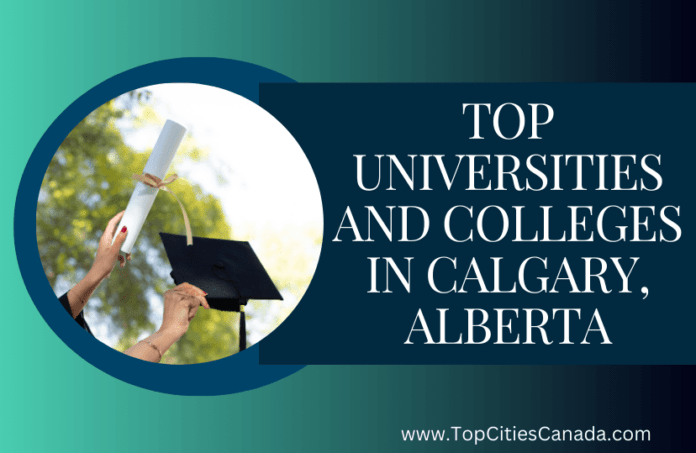Calgary is one of Canada’s most vibrant education hubs, offering high-quality learning, strong career opportunities, and a multicultural environment. Home to world-class universities and colleges, the city provides students with excellent academic programs, modern facilities, and strong industry connections.
Whether you’re looking for research-based education, career-focused programs, or creative studies, Calgary has something for everyone.
Why Study in Calgary?
-
High-quality education recognized globally
-
Strong employment opportunities after graduation
-
Affordable living costs compared to other major Canadian cities
-
Diverse and inclusive community
-
Strong student support services and campus life
Top Colleges and Universities in Calgary
1. University of Calgary (UCalgary)
Overview
The University of Calgary is one of Canada’s top public research universities. Founded in 1966, it consistently ranks among the top institutions globally and is known for innovation, research excellence, and industry partnerships.
Key Highlights
-
Ranked among the top 200 universities worldwide
-
Over 33,000 students
-
More than 200 undergraduate and graduate programs
Research & Innovation
UCalgary is a leader in research with:
-
73 Canada Research Chairs
-
Over 80 research institutes
-
Strong contributions to energy, health sciences, engineering, and sustainability
Student Life
The campus offers modern facilities, student clubs, community engagement programs, and experiential learning opportunities.
2. Mount Royal University (MRU)
Overview
Mount Royal University is a public undergraduate university known for its student-focused learning environment and small class sizes.
Programs Offered
-
Arts
-
Business
-
Health and Community Studies
-
Science and Technology
Why Choose MRU?
-
Strong emphasis on hands-on learning
-
Co-op programs and internships
-
High faculty-to-student interaction
3. St. Mary’s University
Overview
St. Mary’s University is a private Catholic institution emphasizing liberal arts education and ethical leadership.
Key Features
-
Small class sizes
-
Strong focus on humanities, business, and sciences
-
Community engagement and service learning
4. Southern Alberta Institute of Technology (SAIT)
Overview
SAIT is one of Canada’s leading polytechnic institutions, known for career-focused education and industry-aligned training.
Programs Offered
-
Engineering and technology
-
Health sciences
-
Business and trades
Industry Connections
SAIT maintains strong relationships with employers, offering co-op placements, internships, and job-ready training.
5. Bow Valley College
Overview
Bow Valley College provides accessible, career-oriented education designed to meet workforce demands.
Programs Offered
-
Business administration
-
Health and human services
-
Information technology
-
Adult learning programs
Student Support
-
Career counseling
-
Academic advising
-
Flexible learning schedules
6. Alberta University of the Arts (AUArts)
Overview
AUArts is Canada’s only stand-alone public art and design university.
Programs Offered
-
Visual arts
-
Design and media arts
-
Craft and digital studies
Creative Environment
Students benefit from studio-based learning, exhibitions, and professional development opportunities.
7. Rocky Mountain College
Overview
Rocky Mountain College offers faith-based education with a strong emphasis on personal development.
Programs
-
Business administration
-
Liberal arts
-
Environmental and social sciences
8. Columbia College
Overview
Columbia College specializes in career-focused diploma programs that prepare students for immediate employment or further education.
Key Areas
-
Business administration
-
Health sciences
-
University transfer programs
Admission Requirements for International Students
1. Application Process
-
Online application submission
-
Application fee (varies by institution)
2. Academic Records
-
High school or post-secondary transcripts
-
Certified English translations (if applicable)
3. English Language Proficiency
Accepted tests include:
-
IELTS (6.0–6.5 overall)
-
TOEFL iBT (71–80)
-
Duolingo English Test (100–115)
-
PTE Academic
(Requirements vary by institution)
4. Financial Proof
Students must show proof of funds covering:
-
Tuition fees
-
Living expenses
-
Return travel
5. Additional Requirements
-
Statement of purpose or personal essay
-
Letters of recommendation
-
Copy of passport
6. Study Permit
Once accepted, students must apply for a Canadian study permit using their Letter of Acceptance (LOA).
Final Thoughts
Calgary is an excellent destination for international students seeking high-quality education, diverse cultural experiences, and strong career opportunities. With top-ranked universities, practical learning environments, and a welcoming community, Calgary offers everything students need to succeed academically and professionally.










